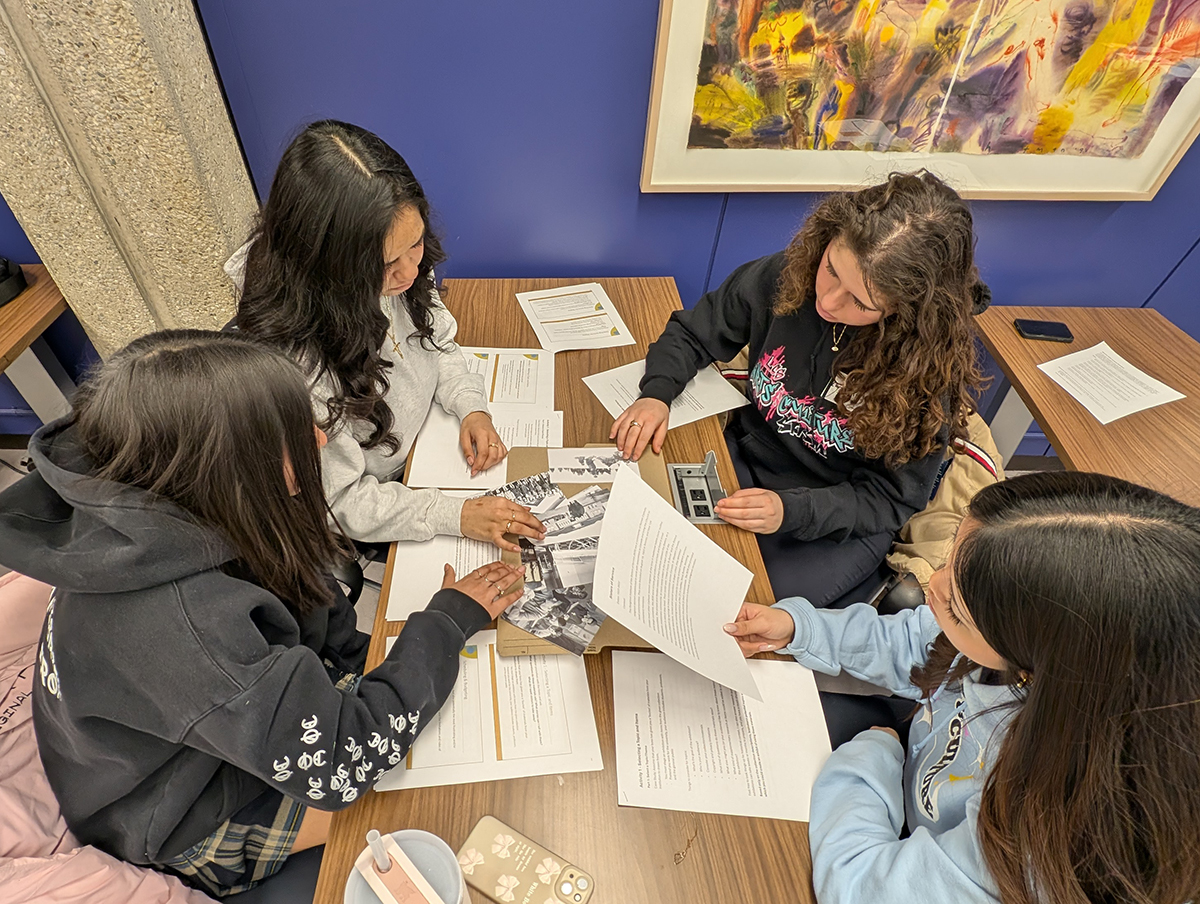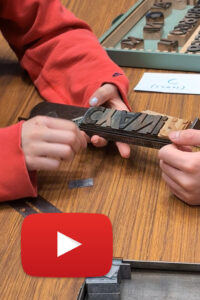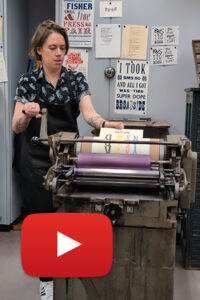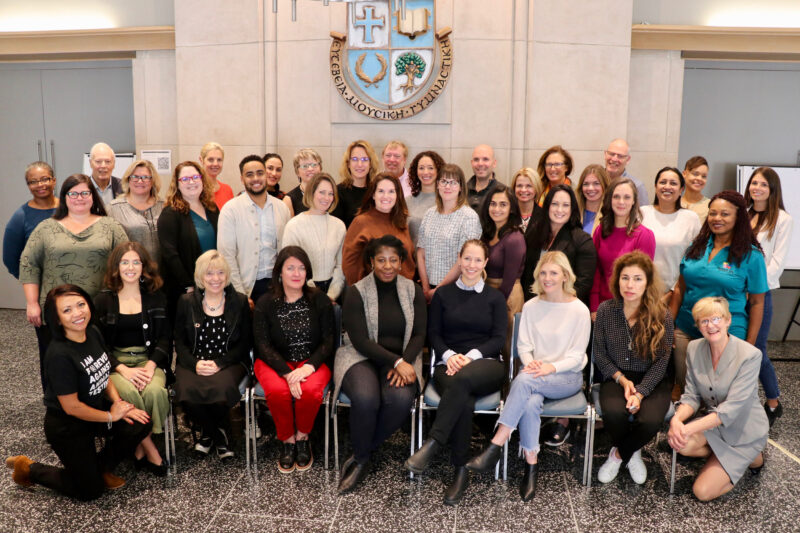Toronto high school students got a glimpse into university life by taking part in hands-on sessions on curation and print making offered by St. Mike’s Continuing Education.
On March 27 and 28, arts and culture students from the Toronto Catholic District School Board’s (TCDSB) Specialist High Skills Major (SHSM) program visited the campus to learn from experts in their field, access to one-of-a-kind resources, and gain practical experience in a university setting.
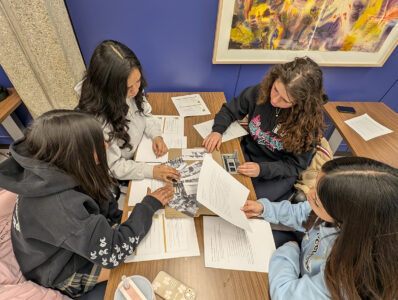
“This offering was a part of bridge building efforts between St. Michael’s and the TCDSB. We want our students to continue to connect with their faith after they graduate, and St. Mike’s has built a strong Catholic community. We were looking at ways to encourage a pathway to St. Mike’s and one of those ways was increasing students’ knowledge of what’s available here. Once we discovered all that St. Mike’s has to offer, especially for the arts and culture piece, we couldn’t wait for our students to come check it out for themselves,” said Lendyl D’Souza, SHSM resource teacher at TDCSB.
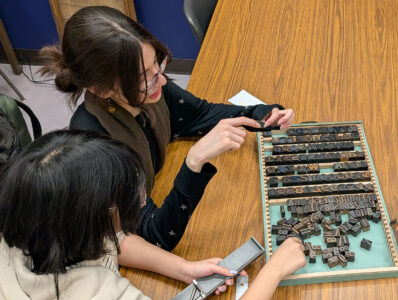
Students enrolled in the SHSM program graduate high school with specialized skills, knowledge, and certifications relevant to their chosen industry. By participating in these workshops, students received a certification that goes toward their high school graduation requirements.
“This collaboration represents the university’s commitment to cultivate a healthy, welcoming community, supportive of its members and community partners such as the Toronto Catholic District School Board,” said Michael Salvatori, Director of Continuing Education.
On March 27, students attended the curatorial techniques workshop hosted by Francesca Rousselle, Processing Archivist at the Kelly Library. She guided students through the process of creating their own exhibit using archival material from two collections that can be found in the John M. Kelly Library’s Special Collections: Archives and Rare Books.
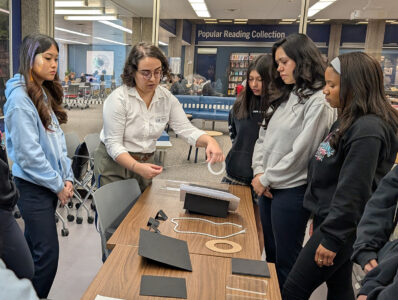
“St. Mike’s is an interesting choice for exhibition work because we’re both a research and educational institution. We have the knowledge of the materials and exhibition techniques, and we can draw from our rich collections,” said Rousselle.
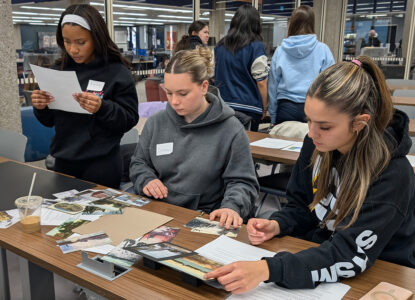
“It’s interesting to come see what things are like at a university and get different perspectives, like careers paths that you can get into by going to university. I didn’t know that something like this [curation] was a career option,” said Grade 11 student Dayary Candelo.
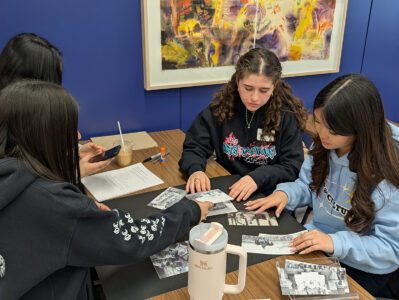
“I learned a lot about exhibiting and the work that goes into putting together a presentation like how to gather the right information and not taking it out of context, picking a topic and expanding on one topic rather than going into a bunch of different topics,” said Grade 11 student Jasmine Clark.
On March 28, students had the opportunity to try their hand at print making using the iron hand and cylinder proof presses found in the Print Studio under the direction of Book and Media Studies Professor Kit MacNeil.
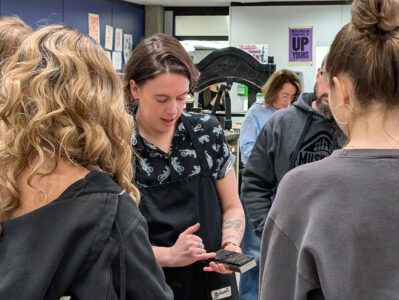
“Thanks to all the various technologies that we have in the Print Studio, we’re able to show students historic forms of letterpress printing and examine the history of printing. St. Michael’s College has made the space and prioritized this as part of a branch of study in the Book and Media Studies program,” said MacNeil.
“I liked learning from people at the university. It’s different from being in a high school classroom, because these people work with university students everyday. They know first-hand that the information they’re giving us is what we would need if we were at university,” said Grade 11 student Chrysanthi Andreopoulos.
Following the workshops, students were treated to a lunch in the Canada Room dining hall and St. Michael’s President David Sylvester presented them with their certificates. Their visit to St. Michael’s was capped off with a campus tour.
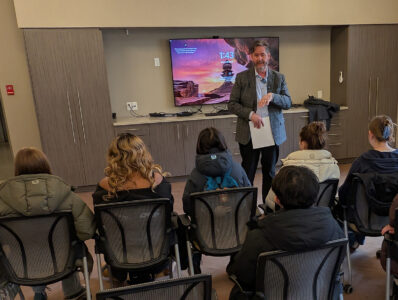
St. Michael’s Continuing Education Division offers a range of courses with instructors who are leading lights in their fields. This conversation with Professor Jacqueline Murray, who is hosting the April 5 symposium, “Cities and Women in the Middle Ages,” launches a discussion series to introduce the people behind our exciting slate of offerings.
Q: Let’s begin with two-pronged question: How do you explain the continuing fascination with the Middle Ages and, in particular, with women in the Middle Ages?
A: Somehow, there is the belief that the Middle Ages is irrelevant to our modern society, but people forget that these are our foundations. The Catholic Church is but the most obvious example, but it is not just an institution. It was mediaeval church thinkers who laid the ethical foundations that permeate western society: ideas such as just price or the need to provide evidence to convict a person in a court, rather than relying on hearsay or public opinion. Our parliament is a mediaeval institution that continues to govern a free and democratic society. It is only now that technology is challenging the predominance of that very important mediaeval invention, the codex, the book, which transformed learning and education because books are both easy to use and easy to search and contextualize the information they contain (ideas can be seen to follow a logical order). E-books and databases decontextualize knowledge (what went before? What comes after?) and are, in my view, more difficult to search. One typo and you are told nothing exists!
If we move from mediaeval culture to mediaeval women, we also encounter misapprehensions: that all women were oppressed or forced to marry. That they gave birth constantly until they died in childbirth. Women were either sitting in a field, covered in mud, as per Monty Python and the Holy Grail, or were grand ladies with servants and great wealth and even some power, as per Eleanor of Aquitaine in The Lion in Winter. Neither perspective reveals the complexities of gender nor the opportunities women found even within a fundamentally patriarchal society. Nuns lived lives relatively unimpeded, with opportunities for education. Women in cities and the countryside were essential contributors to the household enterprise. Men and women, husbands and wives both contributed to the household economy, as did children as soon as they were able. For example, artisan and merchant class women were usually literate, managed the shop and apprentices and did the accounts. Rural women managed the household garden and animals, selling milk, eggs and produce at the local market. And the whole family worked in the fields at different points in the growing cycle. It is these women who tend not to be visible to modern eyes.
Q: Please explain the intriguing title of the day “Cities of Women in the Middle Ages”.
A: The title invokes the famous book by mediaeval writer Christine de Pizan who, after she was widowed, supported herself and her family as a professional. She wrote two significant books that informed the title of the symposium: The City of Ladies and The Book of Three Virtues. The first book collected the stories of virtuous women from the past, in order to counteract much of the prevailing misogynist literature being written by men of the time. The second is a conduct book. Many such books were written for rulers – kings, queens, princes, and so on – but Christine’s book encompassed women from queens to country dwellers and even prostitutes, discussing how they could fulfill the expectations of their rank. So, with these inspirations, the theme took shape as focussing on women, real women rather than ideal tropes, who lived in different cities and lived different kinds of lives. The symposium, then, is a kind of sampler of women’s lives, from different countries, different economic and social ranks, different religious communities who were all part of the surge in urban life that characterized the later Middle Ages.
Q: Obviously there are very practical differences between life then and now but how do women’s lives compare now to then? What is some of the common ground and what are some of the key differences?
A: Cities, then and now, were home to women of disparate backgrounds and professions. They often attract young women to move from smaller, often rural, communities to find the greater opportunities promised by urban life. Cities offered women economic opportunities, the chance to meet new people or to find a husband. Cities also had jobs for women so they could save money for marriage or to simply to find autonomy. This sounds very much like the attractions of city life today.
Q: Please walk us through the day’s schedule, elaborating on how you chose your panel and what you hope attendees will take away from the sessions.
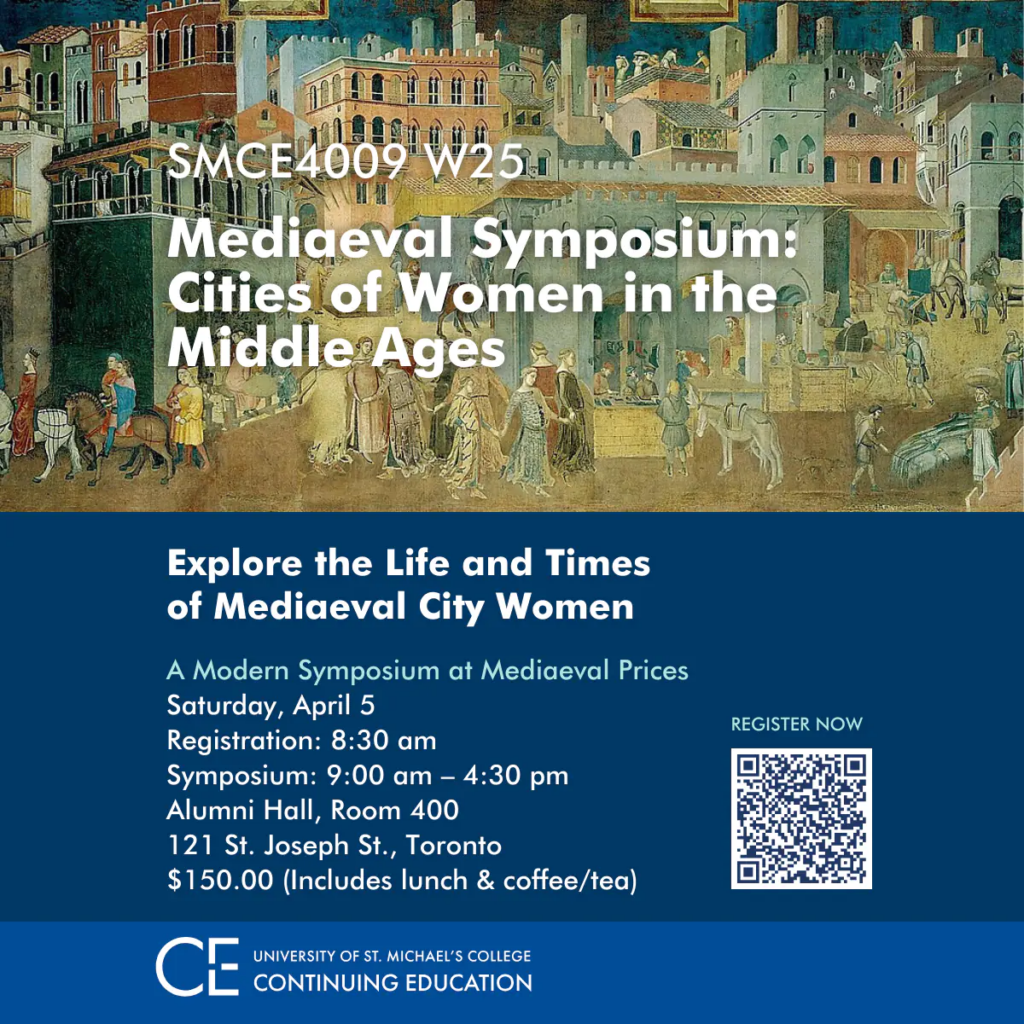
A: My goal was to find the very best scholars working on the most interesting topics; people who could really bring mediaeval urban women to life, across geographic breadth, since different areas of Europe presented women with different life situations. So, we will be fortunate to hear about women in the big cities like Paris and London, leading ordinary or extraordinary lives. And working and merchant women from lesser-known cities in Scotland and Spain, as well from an Italian provincial town. Within that quest for breadth, we will also have depth by looking at specific groups of women in their specific urban contexts. This brings me back to the sampler image again, a sampling of women from a sampling of cities discussed by an exquisite sampling of mediaevalists. I really think this will be an amazing opportunity for the audience – women and men both – to be introduced and given an overview of the late Middle Ages.
There will be three speakers in the morning and two in the afternoon. The morning has a focus on working women in cities that cross from Scotland to Spain, and include merchant women, nursing sisters, and Jewish traders. In the afternoon, we will see women who were engaged in literary debates and another whose story is linked to one of the most famous of mediaeval writers, Chaucer.
There will be coffee breaks along with a mediaeval lunch – the kind of fare found at a mediaeval table, to provide the chance for informal discussion about things mediaeval.
This symposium is intended to leave attendees with a feeling of satisfaction in learning about a new area of history, as well as sparking a desire to find out more. I recommend to those who are left curious or hungry for more Middle Ages, to pick up a copy of The Bright Ages, A New History of Medieval Europe by Matthew Gabriele and David Perry (2021) a brilliant overview of a bright period of history.
Q: One of the sessions talk about women’s poetic expression. What can we learn from that? And what of the lives of Constanca and Cecily, whose names appear in session titles? What do they tell us?
A: Constanca and Cecily represent a larger group of women who were in many ways similar to Christine de Pizan. While they did not have to write to earn money, they were not just literate women, of whom there were many, but also literary women, who could challenge the literary eloquence of the male writers of the day.
Q: How did your own interest in the medieval world begin?
A:In high school I had been interested in history, but at university I floated a bit like so many students today, not knowing what exactly to focus on (and having escaped the current pressure into STEM against both my nature and inclination). Then, by serendipity, I heard a guest lecture about libraries in the Middle Ages, by a wonderful and engaging mediaevalist, and that was it. I was hooked and never looked back. I took everything mediaeval, including Dante, early Christianity, and Latin language, along with kings and popes and then, what became the focus of my graduate studies, marriage and family. With each stage, I kept moving closer and closer to the real people of the Middle Ages, and that is my hope for this symposium, to bring us closer to the real women and the men with whom they shared life in mediaeval cities.
Q: What can the Middle Ages teach us about modern life?
A: It can help us to understand how we reached where we are now. It can provide examples, or perhaps similes, on contemporary situations, such as the current political and economic turmoil, and its results. It can reflect that societies are more complex and richer and varied than they might first seem. And the Middle Ages provide a long view of history as change over time. Mediaevalists deal in centuries rather than decades or even years. Events that seem important or even devastating are also ones that change and evolve. Placing oneself in the broader flow of history helps to put the present into context and allows us to hope for the future.
To learn more about Mediaeval Symposium: Cities of Women in the Middle Ages or other St. Mike’s Continuing Education offerings click here.
Three summative projects from the University of St. Michael’s College’s Diploma in Social Responsibility and Sustainability (SR&S) have been recognized with the President’s Capstone Award. These projects are designed to create a positive social change and environmental impact in the larger community. This year’s winning projects focused on sustainable and just supply chains in Canada; a guide that places a systems lens on a sustainability reporting; and a business case and model comparison of municipal ESG reporting and materiality assessment.
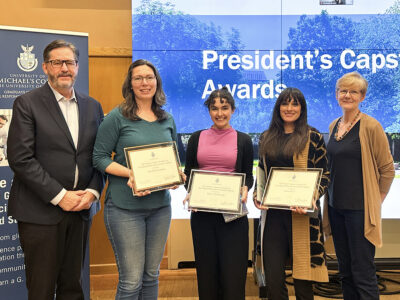
“After learning with a dedicated team of instructors, diverse classmates, and experienced mentors, these projects demonstrate that our students are already empowered to share St. Michael’s values to effect transformative change in the world,” says St. Michael’s President David Sylvester. “We are proud to recognize our students’ work in the SR&S program with the Capstone Award.”
Those considered for the President’s Capstone Award are nominated by their mentors they worked with over the 16-month course of the program. Projects were judged by a four-person panel, which included experts in the fields of corporate social responsibility and sustainability. Winners were selected in the following categories: Advancing Social and/or Environmental Impact; Advancing Social & Environmental Responsibility, Sustainability in their own organization or that of others; Advancing Innovative Practices in Social and Environmental Responsibility, Sustainability and/or ESG.
The winners of the President’s Capstone Award are:
The Advancing Social and/or Environmental Impact recognized Seema Rizvi’s project, “Breaking Chains, Building Bridges: Advancing Towards Sustainable and Just Supply Chains in Canada,” which looks to promote ethical business practices in Canada’s apparel industry. Her report provides companies with strategies to combat modern slavery and offers investors and consumers a framework to understand and enforce the standards set by Canada’s new legislation. Michelle Albanese, Director of ESG and Sustainable Supply Chain at Upswing Solutions was the mentor for this project.
Olivia MacDonald’s “Creating a Sustainability Reporting Guide with a Systems Thinking View,” received top honours in the Advancing Social & Environmental Responsibility, Sustainability category. Her project stemmed from the challenges that arose when creating a sustainability report for her organization. She has used these experiences to develop a guide that can help other organizations prepare sustainability reports. She was guided by her project mentor, Wes Gee, Founder and Chief Sustainability Officer of the Works Design.
Finally, Kate McBride-Staples’ project titled “Municipal ESG Reporting and Materiality Assessment: Business Case and Model Comparison” was selected for the Advancing Innovative Practices in Social and Environmental Responsibility, Sustainability and/or ESG category. In her report, she makes the argument that despite being a tool primarily used in the private sector, municipalities can also benefit from environmental, social, and governance (ESG) reporting and materiality assessment. Yvonne Jeffery (Class 2013), VP Sustainability at Vermillion Energy provided mentorship for this project.
In all, eight students were nominated for the award and the remaining five projects received honourable mentions:
In the Advancing Social &/or Environmental Impact category:
• Christine Michalejko for her paper: “The importance of information sharing in enacting change and meaningful community engagement.” Mentored by Trish Tervit (Class 2022).
• David Harris-Koblin for his paper: “Hastings Crossing – Bia’s As A Vehicle For Social Change.” Mentored by Brian Shurman (Class 2017).
In the Significantly Advancing Social & Environmental Responsibility, Sustainability and/or ESG in their Organization category:
• Alexandria (Lexie) Diemer, for her paper: “Embedding a Creating Shared Value (CSV) Model in Your Organization.” Mentored by Dr. Mimi Marrocco.
• Melissa Hogg, for her paper: “Unlocking Disparity: The Representation of Women in Technology Based Companies.” Mentored by Dr. Mimi Marrocco.
Advancing Innovative Practices in Social & Environmental Responsibility, Sustainability and/or ESG (Environmental, Social, Governance) category:
• Aleisha Apang, for her paper: “At the Intersection of DEI and Partnerships: Applying a lens of diversity, equity and inclusion to build impactful partnerships.” Mentored by Antoinette Ellis.
The panel of judges included Siobhan Barrie (Class 2022), Senior Manager of Social Impact and Sustainability at LCBO; Michaela Becker (Class 2012), Independent Contractor; Dr. Greg Rupik, Director of St. Michael’s President’s Office; and Michael Salvatori, Director of Continuing Education at the University of St. Michael’s.
About the Diploma in Social Responsibility & Sustainability
Forty participants are accepted annually to the St. Michael’s program, which attracts students from across Canada and around the world from sectors as diverse as banking and manufacturing to education and NGOs. This “work as you learn” program enables participants to take their career in Social Responsibility, Sustainability and ESG to the next level. Participants tackle and resolve a Sustainability/ESG challenge in their company in a major Action Project under the mentorship of faculty and co-learners; learn from global thought leaders; experience practical “real world” change management through the ExperienceChange™ Simulation and join a prestigious community of St. Michael’s alumni in continuing education, sharing and networking. Graduates receive the post-nominal letters Dipl.SR&S.
The Diploma will start applications for 2025/26 Cohort in January. Only 40 applicants are accepted. To apply, go to the Diploma in Social Responsibility and Sustainability Website. First intake deadline is March 31, 2025.
For More Information Contact
Kathryn A. Cooper, Program Manager, Diploma in Social Responsibility & Sustainability
Email: kathryncooper@csr-stmikes.ca
Linkedin
Website
A summer workshop from St. Mike’s continuing education division will focus on “Exploring the Arts of the Book.”

The program will be led by Andrew Huot, a book artist and bookbinder in Toronto, where he operates Big River Bindery. Huot has taught bookbinding, conservation, and preservation at the School of Information Sciences at the University of Illinois for 12 years.
In addition to conservation and bookbinding, he teaches bookbinding and book arts in his Scarborough studio, for the Canadian Bookbinders and Book Artists Guild, and at arts centers around Toronto. He holds a Masters in Book Arts from the University of the Arts in Philadelphia and his artists’ books use photographs, linoleum cuts, and text to share the humorous side of everyday life. His artists’ books are in collections including the Art Institute of Chicago, Yale University, Emory University, and Ontario College of Art & Design. See more of his work at bigriverbindery.com and andrewhuot.com
Click here for course details and registration information.
On November 10, the University of St. Michael’s College celebrated Student Capstone Projects, the summative exercise in the Diploma in Social Responsibility and Sustainability Program. These projects are designed to create positive social and environmental impact. The 2022-23 winning projects focused on embedding equity in social and environmental practices, creating shared value in the construction and music industries, and embedding sustainability and social responsibility within small and medium companies, in public institutions and at the country level.
“These projects exemplify the transformational work initiated by students in this St. Michael’s program, and demonstrate how care for our common home and solidarity with the human family can take root across industries, governments, and corporations,” says University President David Sylvester. “We are proud to see our students produce such outstanding work.”
The winners of the President’s Capstone Project Award are:
In the category: Advancing Social and/or Environmental Impact
- Jessica Bermudez: “A Social Impact Guide for Changemakers”. Mentor: Krista Moroz, Manager, Community Partnerships & External Relations, ENMAX
- Ignacio Loor-Colamarco: “University-Government Collaboration for Ecological Solutions in Ecuador”. Mentor: Yvonne Jeffery, VP, Sustainability, Vermilion Energy
In the category: Advancing Social & Environmental Responsibility, Sustainability in their own organization or that of others
- Jessica Aviva Anderson: “Embedding Equity in our Social and Environmental Responsibility Practices”. Mentor: Antoinette Ellis, CEO & Co- Founder, ACE & Co. Ltd
- Marley MacDonald: “NSLC Path to Corporate Sustainability – Applying an Embedded Strategies Framework”. Mentor: Susan Kapetanovic-Marr, Director, Sustainability – Energy and Sustainability Services , JLL
In the category: Advancing Innovative Practices in Social and Environmental Responsibility, Sustainability and/or ESG
- Nicole Monaco: “Creating Shared Value in Construction Projects”. Mentor: Yvonne Jeffery, VP, Sustainability, Vermilion Energy
- Dan Scarcelli: “Creating Shared Value in the Music Industry to Drive Artist Sustainability”. Mentor: Tara Knight, Director, ESG Communications, Scotiabank
Students receiving Honourable Mention:
- Katherine Alyea: “Menopause Inclusive Workplaces: Expanding Workplace Equity for Canadian Women”.
- Glory Keong: “Embedding Sustainability Principles in Enterprise Real Estate”.
- Brooke Graham: “Stronger Together in the Frontline: a DEI Insights Report for Hourly Workers”.
- Stephanie Grant: “Embedding Reconciliation: An Action Plan for KiDrone”.
- Marcell Lawrence: “Enhancing the Employee Experience to Build a Sustainable Workforce”.
- Paul McQueen: “Leveraging Canadian Retail Investor Attitudes on Sustainable Investing”.
Projects considered for the President’s Capstone Award must be distinguished in what they achieve or propose in one or more of the categories.
Nominated projects were judged by a panel which included: Anna Ritacca, Partner & Strategic Advisor, BEL+RIT urbanism (Graduate and Mentor in G.Dipl. SR&S), Dr. Greg Rupik, Director, Office of the President, USMC, and Dr. Michael Salvatori, Director, Continuing Education, USMC.
About the Graduate Diploma in Social Responsibility & Sustainability — Fourty participants are accepted annually to the St. Michael’s program, which attracts students from across Canada and around the world from sectors as diverse as banking and manufacturing to education and NGOs. This “work as you learn” program enables participants to take their career in Social Responsibility, Sustainability and ESG to the next level. Participants tackle and resolve a Sustainability/ESG challenge in their company in a major Action Project under the mentorship of faculty and co-learners; learn from global thought leaders; experience practical “real world” change management through the ExperienceChange™ Simulation, and join a prestigious community of St. Michael’s Alumni in continuing education, sharing and networking. Graduates receive the post-nominal letters G.Dipl.SR&S.
A Business Advisory Committee ensures the Diploma program is relevant and experiential across the field of social responsibility, sustainability and ESG. Members are Sustainability/ESG Leaders, representing a broad range of business sectors, who provide advice and input to this leading program.
The Diploma will start applications for 2024/25 Cohort in January. Only 40 applicants are accepted. To apply, go to the Diploma in Social Responsibility and Sustainability website. First intake deadline is March 31, 2024. Contact: Kathryn A. Cooper, Program Manager, Diploma in Social Responsibility & Sustainability
The University of St. Michael’s College is pleased to announce a new equity-focused award for participants in the Diploma in Social Responsibility & Sustainability Program offered by its Continuing Education division. Ivy Lumia, CEO & Founder, Best in Governance Inc. (BIG), announced the $25,000 commitment at the SR&S Alumni event on October 26. The donation will provide a $5,000 Award each year for five years.
“We are so pleased to announce the BIG Award in Social Responsibility and Sustainability,” said Ivy Lumia, “This award supports students from equity-deserving groups and students who are committed to advancing an equitable and inclusive social responsibility and sustainability practice through the Graduate Diploma in Social Responsibility and Sustainability at the University of St. Michael’s College in the University of Toronto. This award is an expression of our BIG values of Integrity, Diversity and Inclusion of Thought, Accountability, and Best in Class Service.”
“The University of St. Michael’s College is grateful for BIG’s commitment to support our students’ journey,” noted Michael Salvatori, St. the University’s Director of Continuing Education. “Many students transitioning to the social responsibility and sustainability field face significant financial barriers, and this is particularly true of equity-deserving groups. Awards like this empower our students to develop their unique gifts and carry them forward in service to the world.”
The first BIG Award in Social Responsibility and Sustainability will be awarded to a student in the SR&S 2024/25 Cohort. Applications will open in January, 2024.
About Best in Governance (BIG) — Best in Governance Inc., commonly referred to as BIG, is a boutique firm specializing in sustainable corporate governance and ESG solutions, driven by Integrity, Diversity and Inclusion of Thought, Accountability, and Best in Class Service.
About the Graduate Diploma in Social Responsibility & Sustainability — The BIG Award in Social Responsibility and Sustainability joins the Ron Knowles Bursary and the University of St. Michael’s College in the University of Toronto Award for Indigenous Students at Indspire. The SR&S Program hopes to build the complement of awards available to students, to increase accessibility of the program with an emphasis on Black, Indigenous, and other equity deserving groups.
Forty participants are accepted annually to the St. Michael’s program, which attracts students from across Canada and around the world from sectors as diverse as banking and manufacturing to education and NGOs. This “work as you learn” program enables participants to take their career in Social Responsibility and Sustainability to the next level. Participants tackle and resolve a Sustainability/ESG challenge in their company in a major Action Project under the mentorship of faculty and co-learners; learn from global thought leaders; experience practical “real world” change management through the ExperienceChange™ Simulation, and join a prestigious community of St. Michael’s Alumni in continuing education, sharing and networking. Graduates receive the post-nominal letters G.Dipl.SR&S.
Dr. Michael Salvatori, a career educator and author with extensive experience in university administration and teaching as well as at the secondary and primary school levels, has been named the new Director of Continuing Education at the University of St. Michael’s College.
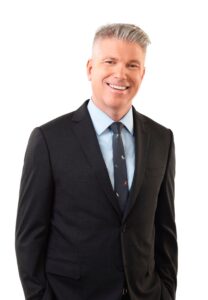
“As an alumnus of St. Michael’s College (SMC 8T9) I am delighted to take on this role and to have the opportunity to serve the university community that has played such an important role in my personal and professional development,” Dr. Salvatori says. “As a committed life-long learner and career educator I look forward to the opportunities to enhance St. Mike’s role in providing meaningful, engaging, and contemporary ongoing learning opportunities for students, alumni, and the greater community. “
As Director, Dr. Salvatori will lead the renewal and expansion of the University’s Continuing Education division. While overseeing existing programs such as the Diploma in Social Responsibility & Sustainability and the Catechesis of the Good Shepherd Certification, he will also design, deliver, and administer new non-degree courses, workshops, and other learning opportunities for a broad audience of adult learners, including Catholic teachers. His role includes responsibility for advancing the mission and strategic objectives of the University by developing new sustainable programming based on the needs of the community and grounded in market research.
“In Dr Salvatori St. Michael’s has a Director of Continuing Education who has an impressive understanding of pedagogy and program management, extensive practical experience in the classroom, and a passion for St. Mike’s. These skills and talents will serve him well as he re-envisions our Continuing Education division, offering our alumni and other members of our community exciting learning opportunities,” says University President David Sylvester.
For more than a decade, Dr. Salvatori served as CEO and Registrar of the Ontario College of Teachers. He has served as President of the board of directors for the Council on Licensure, Enforcement and Regulation (CLEAR) and French for the Future and is a lifetime member of the Canadian Association of Second Language Teachers and the Ontario Modern Languages Teachers’ Association. He is currently a faculty member of CLEAR’s Executive Program for Regulators and a member of Western University’s Alumni Association Board of Directors. Dr. Salvatori comes to St. Michael’s from Niagara University Ontario where he has served most recently as Vice-President. An Associate Professor in the NU College of Education, he has been teaching a foundations course on legal principles in education in Ontario and an elective course on contemporary issues in education in the Bachelor of Professional Studies program which leads to teacher certification in Ontario.
Dr. Salvatori earned a PhD in Curriculum, Teaching and Learning from the Ontario Institute for Studies in Education at the University of Toronto. He also holds MEd and BEd degrees from the University of Western Ontario and a BA from the University of Toronto. Long a champion of second language education, he is fluent in French, Italian, English, and German and is author and co-author of numerous textbooks and teacher resources. He assumes his new role on October 2, 2023.
TORONTO, Canada May 4 – A name change, a new award and an enhanced academic designation mark a season of transformation for the Corporate Social Responsibility and Sustainability program at the University of St. Michael’s College in the University of Toronto.
Graduates of the highly regarded program, now called the “Graduate Diploma in Social Responsibility and Sustainability” receive a Diploma and a designation marked by the post-nominal letters G.Dipl. SR&S (Social Responsibility & Sustainability).
“These changes reflect how the program has evolved since its beginnings almost 20 years ago,” says Program Manager Kathryn Cooper. “Meaningful, long-term social impact of business and not-for-profit partners has never been as important as it is in this time of COVID-19.”
“This program has evolved in response to the global trend toward embedding environmental, social and governance issues in business,” Cooper says. “To survive and thrive, organizations must focus beyond their bottom line, and create positive, long-term social impact.”
President’s Capstone Winners Announced
Graduates at the November, 2019 convocation were the first awarded the new diplomas. This convocation also marked the introduction of the new President’s Capstone Project Award, recognizing exceptional work in summative assignments. The inaugural winners were:
- “Indigenous Impact Report” by Alexandra Biron, recently promoted to Manager, Indigenous, Deloitte Canada.
- “A CSR Strategy for the Canadian Real Estate Association” by Sarah Thirnbeck, recently promoted to Associate Director, Strategic Impact, The Canadian Real Estate Association.
“The calibre of work produced by our CSR students is truly outstanding,” says University President Dr. David Sylvester. “The ethical concerns being discussed in this program reflect the long-standing values of St. Michael’s. CSR and Sustainability is a great example of how universities can have a transformational impact on society.”
Learning to Make a Difference in a Rapidly Changing World
Participants in the Graduate Diploma in Corporate Social Responsibility and Sustainability work full time while earning this university credential through a blended learning approach. Participants:
- tackle and resolve a CSR and Sustainability challenge in their company in a major Action Project under the mentorship of faculty and co-learners;
- learn Next Generation Practices from global thought leaders on the forefront of Sustainability and CSR (aligned with International Society of Sustainability Professionals Certification Body of Knowledge, the Embedding Project and the Transformational Company);
- use practical tools to assess, measure and integrate CSR and Sustainability into their organization;
- experience the practical real world application of CSR and Sustainability and change management through ExperienceChange™ Simulations; and
- join a prestigious community of Michael’s Alumni in continuing education, sharing and networking.
The Diploma is now taking applications for 2020/2021. Only 35 applicants are accepted. Join participants from Deloitte, Secure Energy, Tata Group Retail, SMART CENTRES, Dundurn Press, Chevron, Genuine Health, Civic Works Consulting, Candela Strategies, Children’s Hospital Foundations and more in the upcoming 2020/2021 Cohort. To apply, go to the Diploma in Corporate Social Responsibility and Sustainability Website. Second Intake Deadline is June 30th.
Participants start their learning in July, 2020 through an online Learning Management System and monthly live learning seminars. Module 1 in class will be held in Toronto, Canada, October 14 to 16, 2020. Module 2 and 3 in class will be held May, 2021 and November, 2021 respectively. To apply, go to the Diploma in Corporate Social Responsibility and Sustainability Website. See the program schedule, testimonials, past graduates and news about the program.
About the University of St. Michael’s College in the University of Toronto
The University of St. Michael’s College (USMC), federated with the University of Toronto, is a Catholic institution of higher learning founded by the Congregation of St. Basil, whose motto, “Teach me goodness, discipline and knowledge,” sets the tone for campus life.
A Business Advisory Committee ensures the CSR & Sustainability program is relevant and experiential. CSR and Sustainability Leaders from a broad range of industries from insurance to mining, including: The Co-operators, BMO Financial, Scotia Bank (ret.), Vermillion Energy, Centerra Gold , Aurora Cannabis, Kin&Co and Rotman School of Management (University of Toronto) provide advice and input.
For More Information Contact
Kathryn A. Cooper, Program Manager, Diploma in Corporate Social Responsibility & Sustainability
Phone: (519) 855-9491
Website: https://www.csr-stmikes.ca/
Sustainability, Social Responsibility and related ESG job opportunities are on the rise. Millennials and Gen Z want purpose in their lives. And sustainability and social responsibility is transitioning to be strategically embedded in organizations. New skills and practices are in critical demand for today’s CSR & Sustainability jobs.
Companies are Embedding Purpose, Responsibility, Sustainability
According to a May 29, 2019 Gallup report, Millennials want meaning in their work. They want to work for organizations with a mission and purpose. The emphasis for this generation has switched from paycheck to purpose — and so must organizational culture, products and services. Meanwhile the Next Generation CSR/Sustainability Jobs and Competency Development studies conducted by University of St. Michael’s College, Strandberg Consulting and The Conference Board of Canada’s Corporate Responsibility and Sustainability Institute indicate that Sustainability and Social Responsibility practices are actively transitioning. A survey of 156 CSR/Sustainability Professionals across North America indicated that:
- 68% are developing a medium to long term sustainability/CSR strategy, including goals and targets.
- 68% are improving their company’s value chain & external operating environment thru external collaborations and tackling impacts that they can influence.
- 50% are working with stakeholder collaborations on shared value initiatives.
- 46% are embedding sustainability at the enterprise level & into functional, business unit & departmental level strategies and mandates.
- 41% are developing customer engagement tools & initiatives to improve customer sustainability performance and add value to business segments.
- 38% are advancing innovation to address sustainability barriers.
Apply Now – Graduate Certificate in CSR & Sustainability Delivers Critical Embedding Skills and Practices
The Graduate Certificate in CSR & Sustainability delivers the new skills and practices that are in critical demand for today’s jobs. In this “work as you learn” program, active practitioners and thought leaders guide participants through:
- One-on-one mentoring, with a subject matter expert, throughout the 13 months of the program;
- An Action Learning Project related to your company or professional development;
- Gap assessments, critical thinking and application of embedding practices for CSR/Sustainability; and
- Practical, real world application of CSR and Sustainability change management frameworks through ExperienceChange™ Simulation.
Apply now to the 2019/2020 Cohort of the Graduate Certificate in CSR & Sustainability to gain the skills you need.
Join participants from Sysco, The Body Shop, Aviso, BMO Financial Group, Concordia University, Red Cross and Nature Conservancy, Foundation for Atlanta Veterans Education & Research and many more. Become part of a Community of Practice in CSR/Sustainability for professional development, sharing and networking.
Check out the program schedule, past graduates, testimonials and latest news. Module 1 will be held in Toronto, Canada, October 23-25, 2019. Module 2 and 3 will be held May, 2020 and November, 2020 respectively.
The second intake Application Deadline is June 30th, 2019.
| About the University of St. Michael’s College Corporate Social Responsibility Program
The University of St. Michael’s College (USMC), federated within the University of Toronto, offers a transformational CSR/Sustainability program that creates space for people of shared values to explore, interact, develop and grow. It empowers a community of changemakers to develop the skills and support needed to impact a thriving global future. The CSR/Sustainability Education Council continuously ensures that this program is relevant and experiential. CSR/Sustainability Leaders from a broad range of industries from insurance to mining, including: The Co-operators, BMO Financial, Scotia Bank (ret.), Vermillion Energy, Centerra Gold , ESG Ledger, Conference Board of Canada, and Rotman School of Management (University of Toronto) provide advice and input. For More Information Contact Kathryn A. Cooper, Program Manager, Certificate in Corporate Social Responsibility & Sustainability Phone: (519) 855-9491 Website: https://www.csr-stmikes.ca/ |
Gifted Educator and Founder of the first program providing executive education in the field of Corporate Social Responsibility recognized by University of St. Michael’s College alumni
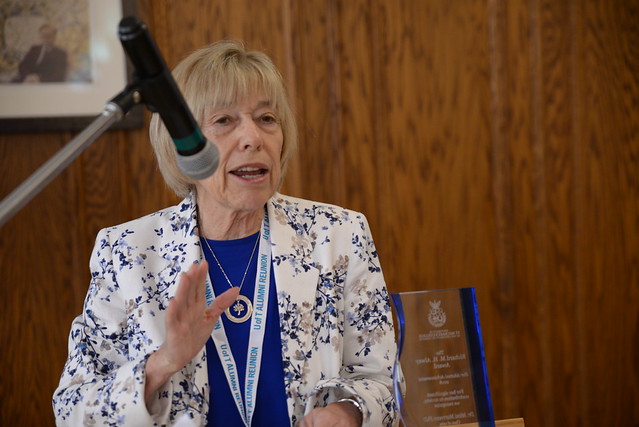
Dr. Mimi Marrocco (Class of 1969) has received the 2019 Alway Award, an honour in recognition of her decades of service and important contributions to the life and reputation of the College. As her former students and colleagues attest, her work—especially in the area of Continuing Education—has influenced the lives of thousands of people.
Former University of St. Michael’s College President Sr. Anne Anderson, CSJ said Dr. Marrocco “gifted USMC with her passion for Continuing Education.” That passion, Sr. Anne said, yielded “innovative, cutting-edge programs across a broad spectrum of interests,” including “our internationally known Certificate in Corporate Social Responsibility.”
Over 300 participants from across Canada and over 20 countries have gone through the CSR program, and over 250 alumni from the program hold positions as VP, Director, or Manager in CSR and Sustainability capacities.
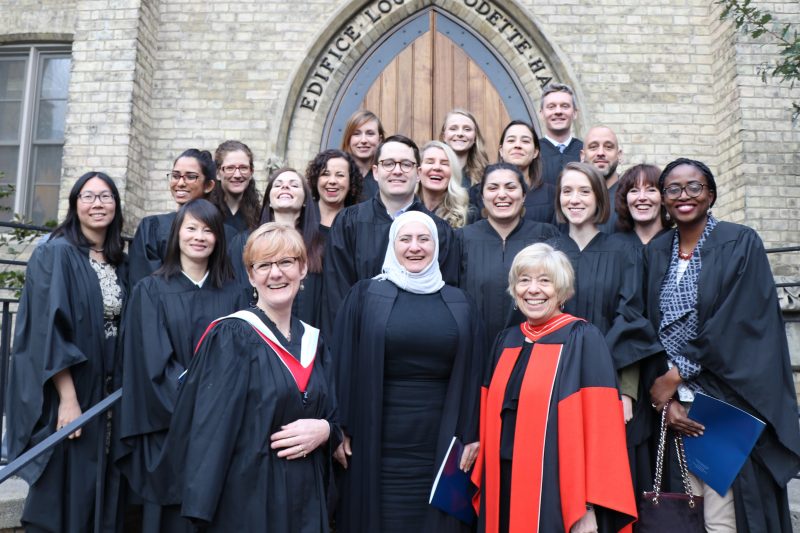
“Mimi is the heart and soul of the CSR Certificate Program,” CSR Program Manager Kathryn Cooper said. She described Dr. Marrocco’s contribution to the field in Canada as decisive: “Dr. Marrocco developed an innovative collaboration with the Conference Board of Canada to launch in 2002 the first program providing executive education in the field of Corporate Social Responsibility. This program created the platform for the very first developments of the body of knowledge, best practices, mentorship and action learning projects in business for Corporate Social Responsibility.”
As the first recognized, professional University Credential in Canada related to CSR, the St. Michael’s program Dr. Marrocco founded has also created a network of alumni and mentors in the field. Program participants receive mentorship support for 13 months, which helps them achieve first-time success in implementing the CSR/Sustainability projects they undertake during the program. To date, participants have implemented over 200 action-learning projects at their companies and organizations, including numerous CSR, Sustainability and Community Investment strategies.
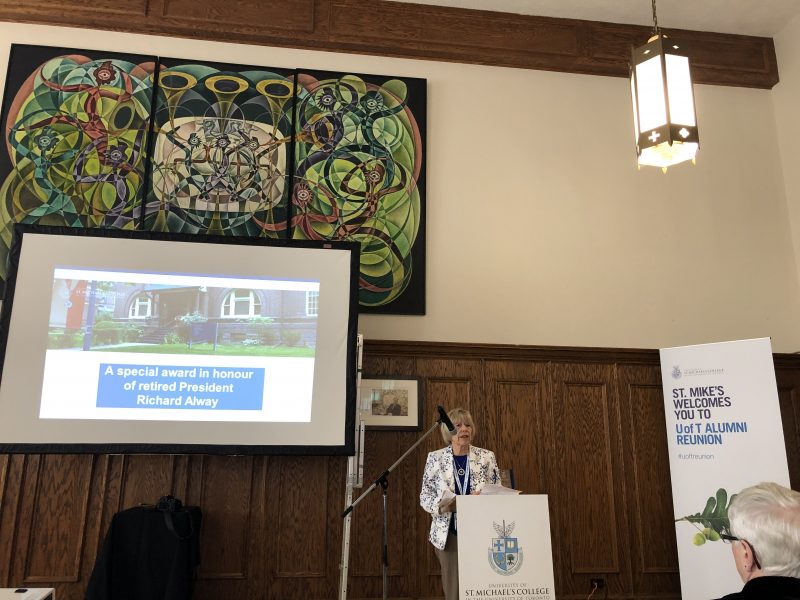
Dr. Marrocco’s former students describe her as a dynamic leader whose talent for teaching is matched by her care for them. “Mimi is so lovely and insightful,” said one, while another said that Dr. Marrocco “has been instrumental in helping me to open my mind to different perspectives.”
After earning a BA from St. Mike’s, Dr. Marrocco received an MA in 1970 and a PhD in 1978, both from the U of T, where she later taught as a member of the English Department. Dr. Marrocco worked for over a quarter century as Director of Continuing Education at St. Michael’s, and served as faculty leader for the CSR Certificate program.
An industry leader as well as an educator, Dr. Marrocco has served on academic and community boards, including stints as president of both the Ontario Council for Lifelong Learning and the Canadian Association of University Continuing Education.
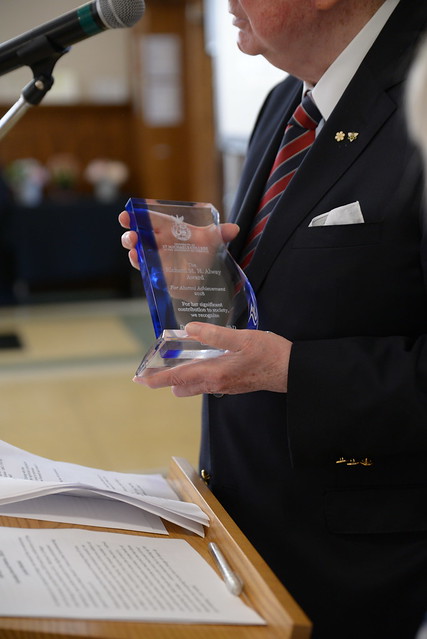
She has served in many roles for Catholic educational and charitable institutions, and she continues to serve in board and/or committee member roles with organizations such as the Arts and Letters Club or Toronto, the Toronto Hunt Club, and the Advisory Committee of the Canadian Business Ethics Research Network at York University.
Named for past St. Michael’s President Dr. Richard Alway, a member of the USMC Class of 1962 and our first lay president, the Alway Award is given in recognition of alumni whose significant contributions to society bring esteem to them and to the College.
For her pioneering work in the field of Continuing Education in Canada, for her support of the mission of the University of St. Michael’s College, for the way she has helped shape the lives of her students, and for her many other achievements, St. Michael’s is proud to call Dr. Mimi Marrocco one of its own. The Alway Award is a small token of the College’s gratitude for her life and work.

